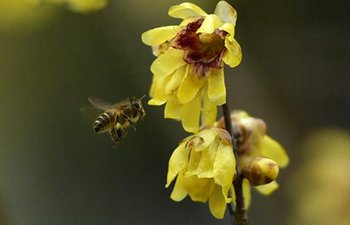SAN FRANCISCO, Jan. 18 (Xinhua) -- An artificial intelligence (AI) robot made by a British university has become a big hero after it helped scientists find a malaria killer in a common toothpaste ingredient, a new study revealed Thursday.
Scientists at the university of Cambridge in Britain used the "Robot Scientist," Eve, in a high-throughput screen and discovered that triclosan, an ingredient found in many toothpastes, may help fight against strains of a malaria parasite that have grown resistant to one of the currently-used drugs to treat the disease.
The findings of the study by the Cambridge researchers were published in the journal Scientific Reports on Thursday.
With the help of the AI-powered Eve, the researchers discovered that triclosan inhibits the spread of a kind of enzyme of the malaria parasite, called DHFR, thus stopping the growth of the parasite in the blood.
The discovery challenged a previous assumption that triclosan inhibits the growth in culture of the malaria parasite Plasmodium during the blood-stage, because it is targeting an enzyme known as enoyl reductase (ENR) found in the liver.
The Cambridge scientists discovered that triclosan was able to target and act on the DHFR enzyme even in parasites that were resistant to the antimalarial drug, pyrimethamine.
Malaria is spread to humans by the bites of a mosquito infected with malaria parasites that are transferred into their bloodstream via its saliva.
The parasites mature and reproduce in the liver of humans, which eventually hijack red blood cells and spread around the body, causing symptoms and even life-threatening complications.
With the new function of triclosan, which inhibits both ENR and DHFR, the researchers believe it is possible that the parasite may be targeted at both the liver stage and the later blood stage.
"The discovery by our robot 'colleague' Eve that triclosan is effective against malaria targets offers hope that we may be able to use it to develop a new drug," said Elizabeth Bilsland, lead author of the study.
Robot Eve was developed by a group of scientists at the British universities of Manchester, Aberystwyth in Wales, and Cambridge.
The development was led by Professor Ross King from the Manchester Institute of Biotechnology at the University of Manchester.
It automates and speeds up the drug discovery process, including auto testing of hypotheses to explain observations, running experiments, and automating high-throughput hypothesis-led research.
AI and machine learning make it possible to create automated scientists that "take an intelligent approach to science," which could greatly speed up the drug discovery progress, King said.

















